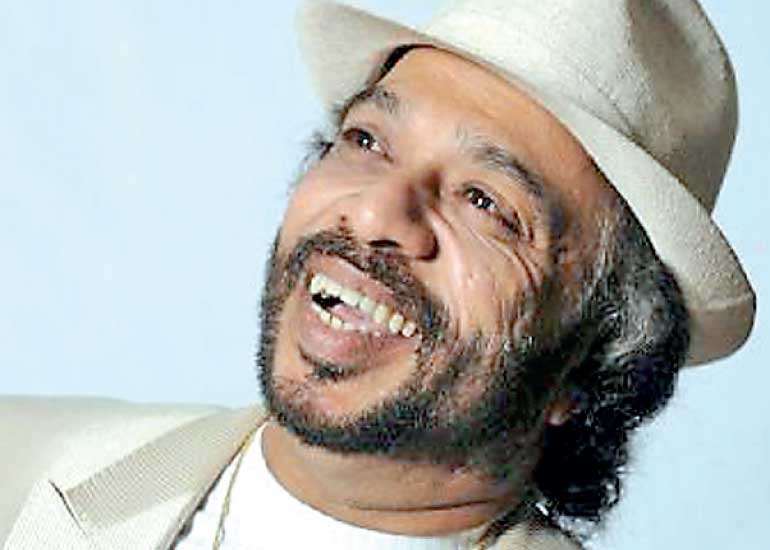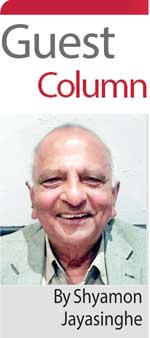Friday Feb 20, 2026
Friday Feb 20, 2026
Monday, 22 May 2017 00:00 - - {{hitsCtrl.values.hits}}
 By Shyamon Jayasinghe
By Shyamon Jayasinghe
Sri Lanka needs a broad consensus for its direction in social and political transformation. A realistic and healthy consensus will depend on the right collective perceptions and perspectives. Our academics and intelligentsia have a lead responsibility in creating such perspectives among our people. Except for the movement for good governance initiated in the lead-up to the last change of Government, our academics have generally been disengaged with what has been going on in our country. A culture of self-centredness reigns among the learned in our island polity. The consequence is that politicians have had the field for themselves alone.
In fact, many of our artistes join existing political configurations in order to eke out something for themselves from the ongoing power struggle. The supreme goals of the blessed land are left behind. This is Sri Lanka today. Malaysia and Singapore, once behind us, are forging ahead leaving behind an island torn with dissension and lacking in direction. Governments are like firefighters dousing fires as and when they occur.
Among the intelligentsia, artistes can play an effective role for many reasons, not only because they have as public entertainers captured the public imagination. “Through their expressive talents, artistes can challenge cultural narratives, shift imagery and inspire emotions in a way that traditional political methods alone rarely do.”
In a 2013 essay entitled ‘Change the Culture, Change the World’, artiste Favianna Rodriguez puts it this way: “You may attend a rally or vote, but you also read books, listen to music, engage with visual art, turn on the radio and create your identity through culture. Artists are central, not peripheral, to social change. To have the movements that make the wave, you need cultural workers.”
Sri Lanka, unfortunately, has had few cultural workers taking the lead in a desperately needed transformation of the social and political milieu. Some of these guys have also joined the bandwagon of the growing number of birds who feather their own nests.
We had one prominent and talented man who once announced that the former President Mahinda Rajapakse hails from the same line as Sakyamuni Buddha! Other artistes are seen on reactionary political stages clowning on behalf of reactionary reversal. This has been historically true of other societies, too.
Some artists like Van Gogh and Pollock have been true to their own aesthetic vision while others like Picasso and Warhol have not.
One critic, observing how Picasso mass produced some of his work (50 versions of the same line) asked: “Did Picasso mass produce art out of greed?” Greediness is human unfortunately. To empathise with the dishonest among us we have to realise that our kind of artiste does not make mega bucks like those in the West. Our art is still in its infancy as regards market maturation.
Onto the happier side came Nanda Malini, who once sang against social injustice. She has since retired into her own world. I know at one stage she was threatened. Artistes are free spirits unchained by the status quo who, by that token, have often invited the wrath of authoritarian rulers.
On the other hand, Gypsies leader Sunil Perera stands his ground unafraid and unbowed today, rather a lone star, beckoning change. He has been doing this for decades now. As a performing artiste, Sunil still attracts big crowds. He sings and acts with his trademark hat on. He mimics and parodies beautifully with his own original lyrics and music. A most amiable man. His satire in word and voice is utterly telling and impactful. What is also important is that Sunil transcends the current political configurations and positions himself above the conflict. He declined overtures from President Premadasa to sing at Gam Udawa. He never got onto a Rajapaksa stage. In Australia, Sunil Perera has attracted crowds in full-capacity halls at a gate of $ 100 and over. What he sings relates to our thoughts.
Sunil Perera’s modus operandi is to compose songs that are not merely entertaining but also cognitively transformative. His singing acquires depth on that score. After listening to his song I Don’t Know Why, who amongst us can avoid laughing at the comic hypocrisy of our political leaders sensing the outrage of our dysfunctional political system? Sunil’s is a subversive voice that audiences enjoy. Subversion of the prevailing order is a precondition for its demolition. Here is a translated excerpt of one of his famous songs:
I Don’t Know Why (The video presentation is superb!)
Having won….
How come they put on layers of fat, akin to a shark?
Upon defeat, how do they become thin like the geckos?
The gecko becoming a shark
The shark becoming a fat swine?
Why?
MPs and Ministers
Will tell you that.
There is a video of a TV interview with Sunil Perera doing the rounds on social media these days. Sunil conveys som

e street-wise home truths in this. He even undermines the sanctimonious humbug of nationalists.
Who says our country is a divinely fortunate land (‘pinketha’), Sunil asks his interviewer. If that is so, why are so many of our young people risking their lives and going in boats as refugees? Hoards of Sri Lankans have left the land to live in foreign lands – the UK, Europe, Australia, etc. If we are a ‘pinketha’ it should be the other way about: people in other countries should come and live he
re in Sri Lanka.
“See how very difficult the life of ordinary families is here,” Sunil says. “Take the example of trying to find a school for a child. You have to beg behind politicians and pay big bribes to get a school. Some parents have even come to me to ask me to intervene. Why should this happen at all? You go to Australia and you can have the option of five good schools for your child there.”
“In my case I have made my money and I still do. But how about the multitude of others?” Sunil asks. The interviewer asks him why he doesn’t enter politics. Sunil self-deprecatingly says, in platonic mode, that the Legislature is for those who are well educated in the arts of Government. He has his A levels and that isn’t enough.
Throughout history, artistes have helped promote social change in different countries. Both the French Revolution and the Russian Revolution had been presaged by an intellectual background largely formed by artists.
Artistes do so not as blatant message-senders. It is not the purpose of a drama, a novel, a poem or a painting to give any message. On the other hand, what happens in a good artistic production is the dawning of a new realisation by way of a vicarious experience on the part of the audience. A good novel, for instance, gets the reader to ‘experience’ and ‘feel’ like the characters and situations in the novel. In this manner, some kind of mutation does occur inside the mind of the reader.
John Lennon famously sang, ‘Imagine’, where he imagined a world without religion. His listeners came to share that imagined world with him.
(The writer can be reached via email at [email protected]).